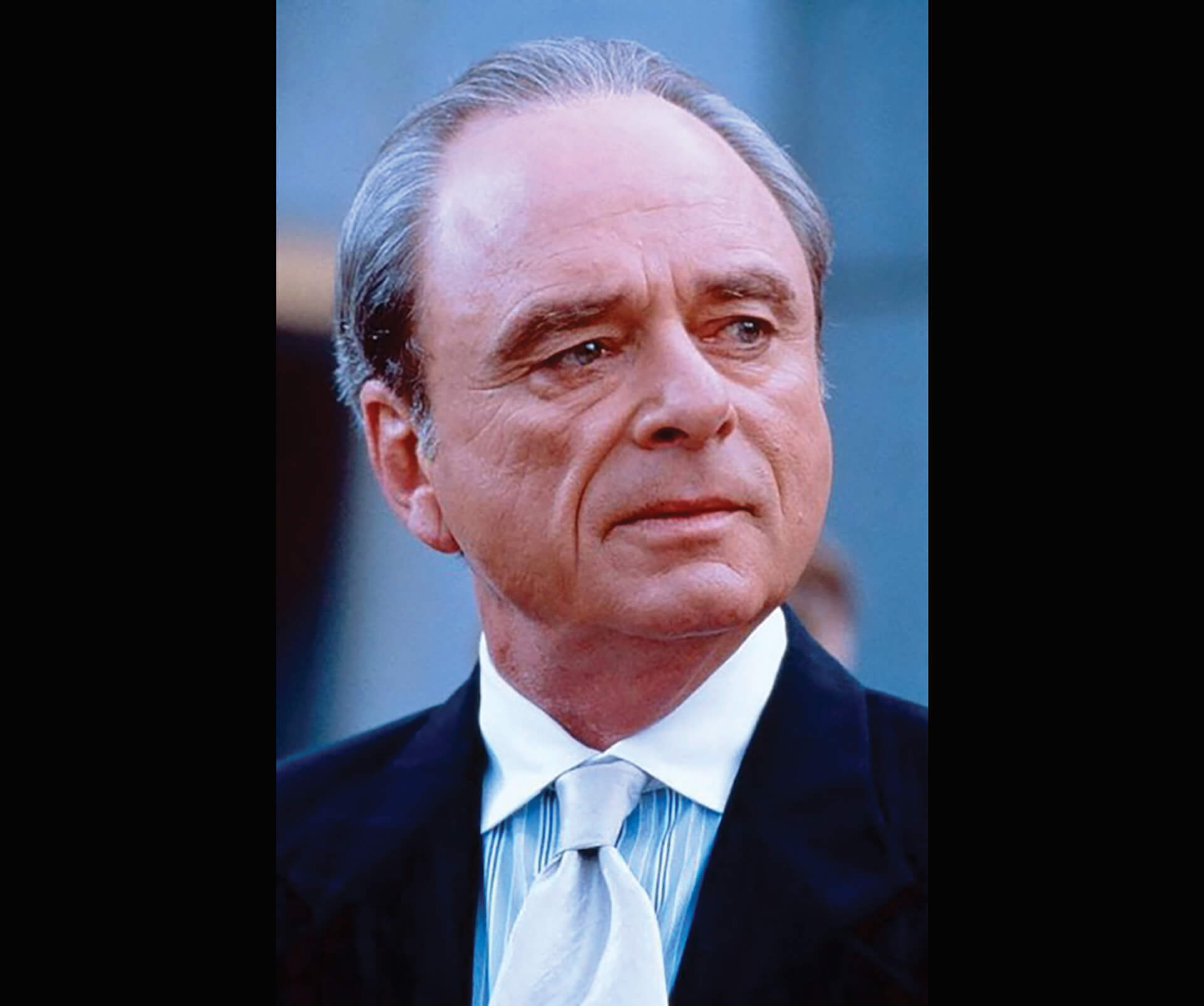Harris Yulin Does Nixon At Bay Street

“You’re saying that there are certain circumstances where a president can decide it is in the best interest of the nation and do something illegal?” David Frost prodded, cameras rolling.
“I’m saying that when the president does it, that means it’s not illegal,” answered Donald Trum — sorry, Richard Nixon, in a play perhaps more ripe and relevant today than when it debuted in 2006.
Frost/Nixon, Peter Morgan’s acclaimed dramatization of the monumental televised interview series during which British talk show host David Frost challenged former U.S. president Richard Nixon to hold himself publicly accountable for his involvement in the Watergate scandal, will open at the Bay Street Theater on Saturday, June 30, and stars Bay Street veterans Daniel Gerroll and Harris Yulin as Frost and Nixon, respectively.
Yulin, who is renowned for his extensive career in theatre (Bay Street and Broadway’s Hedda Gabler), television (“Ozark,” “Frazier”), and more than 100 films (Scarface, Clear and Present Danger, Training Day), is greatly looking forward to returning to the Bay Street stage as the controversial character that struck him as an irresistible acting opportunity.
“Nixon is a great question mark in our history in this country,” Yulin remarked. “I felt one way about Nixon when I was young and protesting the war, and it’s quite a different thing to get more inside of that whole era. It’s incredibly interesting, not only as a character, but to go back over those times and look at them in perhaps more depth, or maybe a different kind of look than I had at the time.”
In preparation for the part, Yulin, who shares a home in Bridgehampton with his wife, actress Kristen Lowman, has been watching myriad old tapes and interviews, and doing a considerable amount of reading about the ex-president, whom he admits he hasn’t given much thought to in recent years, but is coming to understand in a new light through his exploration of the role.
“There’s a kind of depth now that I’m trying to look at him with,” Yulin said of his character. “It’s definitely given me a very different perspective than I once had about him, for sure.”
Historical Battle of Wits
Finding fresh interpretations of non-fictitious characters can be a complex affair for actors, but this is far from the first biographical role Yulin has taken on. In the 1985 miniseries “Robert Kennedy and His Times,” he portrayed U.S. Senator Joe McCarthy.
“I hate Joe McCarthy,” Yulin stated, with a laugh. “But that’s not operative when I’m playing him; instead I’m trying to find out where he’s coming from. On the one hand,” he mused, “you have a feeling that you want to give the character you’re playing a break; that would be true whether he’s fictional or real. You want to look for, not his best side, but the whole person. So it’s not a place for polemics or bringing an agenda, or a point of view.”
The same could be said of the play as a whole, and Yulin commends Frost/Nixon director Sarna Lapine for her straightforward, unencumbered approach. The Bay Street production uses minimal effects and no major set changes, striving for uninterrupted fluidity, economy, and immediacy in presenting the historical battle of wits.
“It really moves along, and so we fall back onto the story of the two characters; how they prepare, what they’re both trying to do, how it resolves, when they meet, the nuances of that relationship, and so on,” said Yulin.
Ultimately, Yulin posited, the play is a means of contextualizing a pivotal moment in American history. The Frost-Nixon interviews aren’t difficult to track down in the age of Google and YouTube, but with a fuller understanding of the events surrounding the interviews and the pressures beneath them, a viewer may watch them differently.
“The play provides context for what one sees in the interviews,” Yulin explained. “A context to understand how they came about, which is interesting; what kind of preparation had to go into them; how the characters felt about what they had done; how they were going to approach the next interview . . . All this may sound a little dry, but I don’t think it is in the playing of it. But it provides context, that’s the main thing. So you have some understanding of the story.”
Polarizing Emotions
As for how the story of Frost/Nixon will affect a Trump-era audience, the jury’s still out; but if Yulin’s experience with Guild Hall’s presentation of Are You Now or Have You Ever Been? (a play about the 1950s House Un-American Activities Committee hearings) last year is any indication — along with Bay Street’s most recent offering, Fellow Travelers, also about the HUAC hearings — the impact could be powerful.
“The reaction to [Are You Now] was quite overwhelming,” Yulin, who both acted in and directed the piece, recalled. “I mean, it was spontaneous, and it was so effusive and passionate — and I’m talking about the audience — and I think that really had to do with how one naturally relates whatever one is seeing to one’s own situation. Or, to the country’s situation, in this case.”
With the current POTUS deflecting one accusation of shady dealings after another, and claiming, “I have the absolute right to pardon myself,” it’s possible that climax of the Frost/Nixon — in which a cornered Nixon seems to have no choice but take full responsibility for his un-presidential actions — could evoke polarizing emotions from vicarious viewers.
“I guess it would depend on which way they lean,” Yulin speculated, “but certainly there’s no comparison between the two people — or characters, if you want, because I always think Trump is playing a character; he found one on TV and now he plays it. Nixon was, for all of his faults, which he had many, a man of some erudition, with a quite formidable intellect, and who finally wanted to bring a lasting peace to the world and to the country. So people can make their own comparisons.”
Might an engrossing production of Frost/Nixon provide catharsis for a 2018 audience? Or might it elicit indignation? Or even a call to action?
“However the audience reacts, it will react,” Yulin said. “It’s in the eye of the beholder.”



